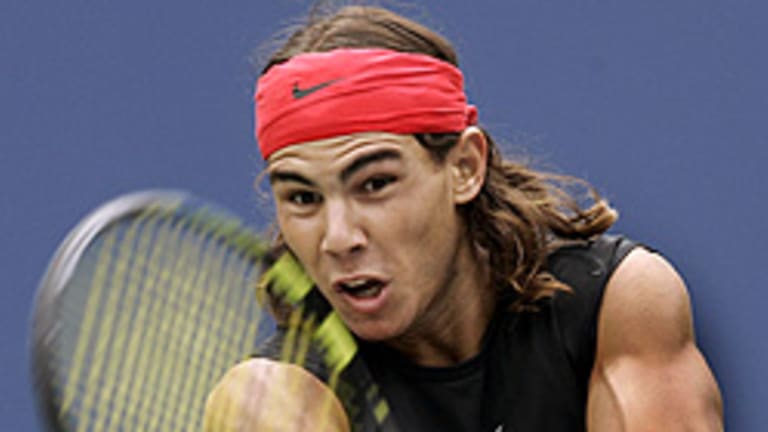(Ed. note - this post has been edited; for some reason, the paragraph at the end of the previous version, with Rafael Nadal confessing that he did not understand Charlie Bricker's question, had been misplaced to the bottom of the post. It is now back where it belongs. Don't ask me how it happened, but I apologize - Pete)
A comment poster yesterday suggested that I shorted all you Nadal KADs by not posting more about his press conference, so here’s the part that got me thinking during Nadal's presser:
Here’s this kid 20-year old kid who never met a chair in which he couldn’t slouch, his jet-black hair cascading over his arms as he appears to fold them up in six different places. Ultimately, he lets his chin,or on some occasions his cheek (ever observe a kid watching cartoons? You got it.), come to rest there.
So here’s Nadal, the product of a culture that is as laid-back as he is hyper-active (whoops! I think we just defined one of Nadal’s most distinctive and anomalous qualities. . .), and a youth who still struggles with the English language as if were a plateful of linguini that he’s got to eat with a spoon - and now here's Charlie Bricker of the South Florida Sun-Sentinel, a veteran (some have used the word "crusty", which is relevant here) NFL reporter and tennis beat writer who knows the game inside-out.
Charlie, many of you may know, appears to take special pride in re-creating entire points that transpired in any given match, just to get at a seemingly obscure point (to some) about, oh, going cross-court instead of down-the-line when Ivan Ljubicic, coming in off a second serve down the center stripe, has hit a forehand volley with not-quite-enough stick on it to your backhand corner. . .
In other words, this was meeting of an in-to-lunch kid and grizzled Grand Mastery of Tennis Geekery, American division, on the latter's turf. Here's the exchange that transpired between them (an odd couple if ever there was one), in Jet Boy’s presser yesterday. The subject is the round robin format proposed for some tournaments by the ATP for 2006:
Bricker: You say three matches guaranteed (for promoters), and that would work if there were a 32 draw with eight groups of four players each. But at the end, they were talking about a 48 draw with 16 groups of only three players. So you only play two matches, and it would be much more difficult if a top player lost to move on to the knockout phase.
Nadal: First of all, I don't understand exactly (Nadal makes this confession with complete aplomb, as if were irrelevant; can you bottle and sell such insouciance?) . . Second, if you play two matches and you are best player, you have more chances than if you just play one. That's true or not; what do you think?
Bricker, showing no sympathy whatsoever despite having just flung Jet Boy off the linguistic deep end (tough love; it's a tough thing) nodded and grumbled something. Nadal continued:
Because if you are the best, the best of all the players, normally you don't gonna lose 6?1, 6?1. You gonna lose 7?5, 6?3 or 6?3 in the third. And if you win the match, so with draw and part of draw, no? With the tie, you have more chances for go to the second round or quarterfinals.
(At this point, nobody is sure of what Nadal is saying, perhaps not even Nadal himself - you can check the transcript yourself if you want to give it a shot.)
Bricker pressed on:. True. But if you lose your first match and win your second and you win one, lose one, everyone has to be 1?1 for you to get out. Does that make sense?
Nadal: You have better result, you go. Nadal looked directly at Bricker, and asked with utter sincerity: You don't like?
The thing that comes through in all this, and on so many other similar occasions, is Nadal’s sincerity - and the sheer enthusiasm and even-handedness he brings to his job as a budding tennis icon. He’s overflowing with good will that’s as irrepressible as his appetite for the game.
Roger Federer disarms you with his laconic sophistication; in some ways, he’s the ultimate Euroman. But the UE, polite and well-mannered as he is, often has a bit of ice in his soul; it just comes with the territory of old culture in a cold place.
Nadal, by contrast, disarms you with his sunny callowness; he’s the Islander, and the Islander, polite and well-mannered as he is, often has a tongue of fire in is soul; it just comes with the territory of a less rigorous culture in a warm place.
Just another reason to love the match-up. We''re lucky to have it.
**
